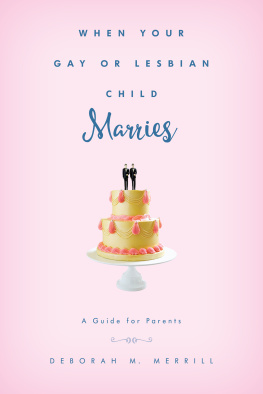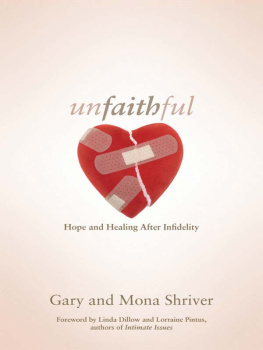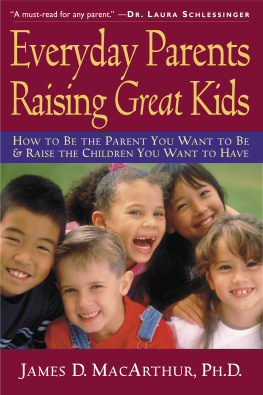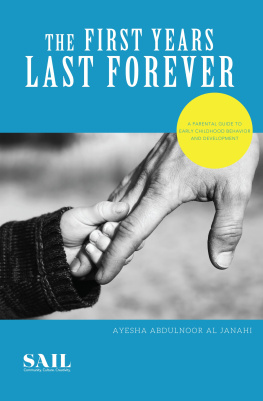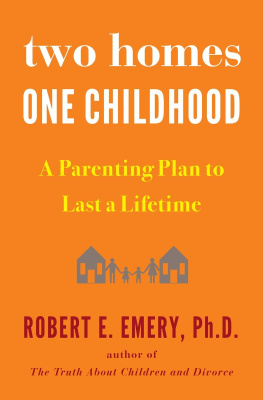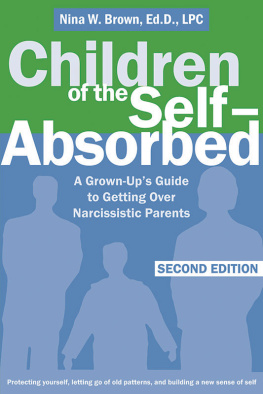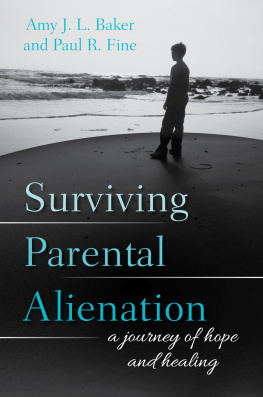PARENTS WHO CHEAT
PARENTS
who CHEAT
How Children and Adults Are Affected
When Their Parents Are Unfaithful
Ana Nogales, Ph.D.
with Laura Golden Bellotti

www.hcibooks.com
Library of Congress Cataloging-in-Publication Data
Nogales, Ana, 1951
Parents who cheat : how children and adults are affected when their parents are unfaithful / Ana Nogales with Laura Golden Bellotti.
p. cm.
Includes bibliographical references.
eISBN-13: 978-0-7573-9834-6 (ebook) eISBN-10: 0-7573-9834-0 (ebook)
1. AdulteryPsychological aspects. 2. ParentsFamily relationships.
I. Bellotti, Laura Golden. II. Title.
HQ806.N64 2009
306.73'6dc22
2009012227
2009 Ana Nogales, Ph.D., and Laura Golden Bellotti
All rights reserved. Printed in the United States of America. No part of this publication may be reproduced, stored in a retrieval system, or transmitted in any form or by any means, electronic, mechanical, photocopying, recording, or otherwise, without the written permission of the publisher.
HCI, its logos, and marks are trademarks of Health Communications, Inc.
Publisher: Health Communications, Inc.
3201 S.W. 15th Street
Deerfield Beach, FL 334428190
Cover design by Larissa Hise Henoch
Interior design and formatting by Lawna Patterson Oldfield
To my family,
from whom I learned
about love and loyalty
Forgiveness is the final form of love.
REINHOLD NIEBUHR
CONTENTS
I am deeply grateful to my literary agent, Susan Schulman, for her warm support and strong belief in this book.
I extend many thanks to our editor, Michele Matrisciani, for her enthusiasm and wise editorial guidance.
I would also like to thank Dr. Sonnee Weedn, who was instrumental in helping to access the resources and networks to launch our Parents Who Cheat Survey.
I appreciate, as well, the generous efforts of Dr. Nora Comstock, who helped us spread the word about the Parents Who Cheat Survey.
I am forever grateful to Yolanda Hernandez, my right hand, who is always there to facilitate my work. With her assistance I am able to do so much more.
And, finally, my heartfelt gratitude to the women and men who openly and graciously shared their experiences of dealing with a parents infidelity.
O ver the thirty-three years of my clinical practice, I have heard from hundreds of clients about the painful repercussions in a childs life when one parent betrays the other. I felt compelled to write this book because I believe the effects of parental infidelity on children of all ages is a profoundly important issue that has been largely ignored. While much has been written about the impact of divorce on children, and although there are numerous books on how couples can cope with the fallout of marital infidelity, little attention has been paid to how children are affected by a parents unfaithfulness. What are the emotional consequences for the childyoung or adult when his or her parent cheats? How can parents undergoing an infidelity crisis help their child cope with his or her reactions? And how might adult children deal with their own parental infidelity-related issues? My objective was to write a comprehensive book for mainstream readers that would address these overarching questions.
Young children, as well as teens and young adults, may respond to their parents infidelity with shock, confusion, rage, cynicism, sadness, shame, or a combination of these reactions. While they have nothing to do with one parents decision to cheat on the other, children are often left feeling guilty, hopeless, tainted, or damaged words they often use. As adults, children whose parents cheated are frequently unable to enjoy a healthy relationship because they are plagued by a profound lack of trust, an attraction to partners who cheat, or a proclivity toward infidelity themselves.
Once I knew I wanted to write this book, part of my research involved undertaking a survey of adult children of infidelity. Ive created the term children of infidelity to identify children of any age whose parent or parents engaged in one or more extramarital affairs.1 I wanted to find out more about how children are affected when one or both parents cheat. Seventy-five percent of those who responded to our Parents Who Cheat survey reported that they felt betrayed by the parent who cheated. Sixty-two percent felt ashamed.
Eighty percent felt that their attitude toward love and relationships was influenced by their parent having cheated, and 70 percent said that their ability to trust others had been affected. Eighty-three percent stated that they feel people regularly lie. And yet, 86 percent reported that they still believe in monogamy! The complete survey results can be found in the Appendix, but beyond the percentages, the stories these adult children of infidelity tell about how their lives were impacted by a parents unfaithfulness reveal a more complete and poignant picture. Youll hear many of these compelling stories throughout the book.
Some people may contend that my book is based on an outdated premise; namely, that parental monogamy is healthier for children than parental infidelity. Infidelity is so common, some may argue, and even justified in many cases, that children these days can easily adapt. Ill admit that there are a number of seemingly reasonable justifications for marital infidelity. Some claim that because people live longer nowadays, it is unrealistic to expect married couples to be faithful throughout their lives. Others point to the fact that modern life means women and men engage in more varied experiences outside the home and have greater opportunities to interact with new people, thus making sexual affairs more inevitable. And there are those who argue that our cultures liberalized sexual mores have made marital fidelity anachronistic.
In spite of those who believe that monogamy is a thing of the past, research proves otherwise. A 2008 Gallup poll on moral issues found that 91 percent believed married men or women having an affair is morally wrong. My survey indicates that children still expect fidelity and loyalty between their parents, and adult children whose parents cheated still want monogamous relationships themselves. By and large, adult children of infidelity know from experience the extent to which the whole family suffers when a parent is unfaithful, and therefore most do not want to follow in their unfaithful parents footsteps.
I believe that it is within the spirit of humankind to create, nurture, and sustain healthy, monogamous relationships from which both couples and children benefit. Even in our modern age, most men and women continue to seek a lifelong partner, and couples who marry continue to promise and expect sexual fidelity. When they do, their future children are rooted in that promise. Sexual affairs break the promise through secrecy and lies, and children cant help but feel the painful effects, regardless of their age. According to the survey undertaken for this book, as well as the hundreds of clients I have treated, most children are hurt by their parents infidelity because, like the deceived parent, they feel betrayed. And like 93 percent of the American public,2 they still believe that marital fidelity is the most important element in a successful marriage.
My hope is that whether you are a betrayed parent, a parent who cheated, or an adult child whose parent was unfaithful, reading this book will help you understand and courageously deal with the adverse effects of parental infidelity.
I think it made me very afraid of intimacy for many, many years. It did color every relationship I had with women. Im not sure if I trusted women, for a long, long time.
Next page


